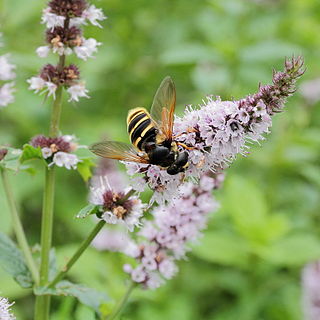
Mentha is a genus of plants in the family Lamiaceae. The exact distinction between species is unclear; it is estimated that 13 to 24 species exist. Hybridization occurs naturally where some species' ranges overlap. Many hybrids and cultivars are known.

Scaevola is a genus of flowering plants in the Goodenia family, Goodeniaceae. It consists of more than 130 species, with the center of diversity being Australia and Polynesia. There are around 80 species in Australia, occurring throughout the continent, in a variety of habitats. Diversity is highest in the South West, where around 40 species are endemic.

The Cyperaceae are a family of graminoid (grass-like), monocotyledonous flowering plants known as sedges. The family is large, with some 5,500 known species described in about 90 genera, the largest being the "true sedges" genus Carex with over 2,000 species.
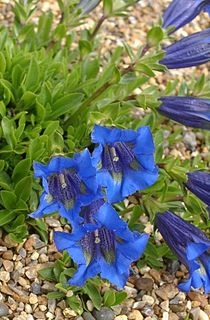
Gentianaceae is a family of flowering plants of 103 genera and about 1600 species.

Pogostemon is a large genus from the family Lamiaceae, first described as a genus in 1815. It is native to warmer parts of Asia, Africa, and Australia.

Tribulus is a genus of plants in the family Zygophyllaceae and found in diverse climates and soils worldwide from latitudes 35°S to 47°N. The best-known member is T. terrestris, a widespread invasive species and weed.
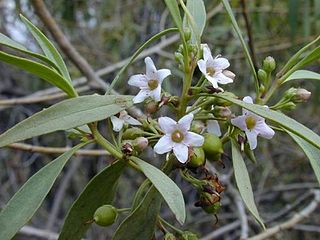
Myoporum is a genus of flowering plants in the figwort family, Scrophulariaceae. There are 30 species in the genus, eighteen of which are endemic to Australia although others are endemic to Pacific Islands, including New Zealand, and one is endemic to two Indian Ocean islands. They are shrubs or small trees with leaves that are arranged alternately and have white, occasionally pink flowers and a fruit that is a drupe.

Parkia is a genus of flowering plants in the legume family, Fabaceae. It belongs to the subfamily Mimosoideae. Several species are known as African locust bean.

Actinotus is a genus of flowering plants in the family Apiaceae, subfamily Mackinlayoideae, with about 18 species. It is native to Australasia. Its best known member is the flannel flower, a common sight in Sydney bushland in the spring. The generic name, meaning "furnished with rays" is derived from the Greek stem aktin-/ακτιν- "ray" or "sunbeam".

Banksia sect. Oncostylis is one of four sections of subgenus Banksia subg. Banksia. It contains those Banksia species with hooked pistils. All of the species in Oncostylis also exhibit a top-down sequence of flower anthesis, except for Banksia nutans which is bottom-up.

Mirbelia is a plant genus belonging to the family Fabaceae. It is endemic to Australia, occurring in every mainland state except South Australia.
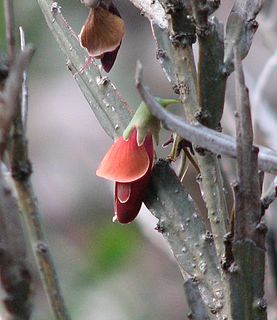
Bossiaea is a genus of flowering plants in the pea family Fabaceae, consisting of about 70 species which are native to Australia. The genus is named in honour of Joseph Hugues Boissieu La Martinière, a botanist on La Pérouse's expedition to Australia.

Daviesia, commonly known as Bitter-peas, is a large genus of flowering plants in the legume family. They are native to Australia, with a centre of diversity in Western Australia.

Calytrix is a genus of shrubs in the family Myrtaceae described as a genus in 1806. They are commonly known as starflowers. Calytrix are endemic to Australia, occurring in the.

Operculina is a genus of plants in the morning-glory family which that are found throughout the world.
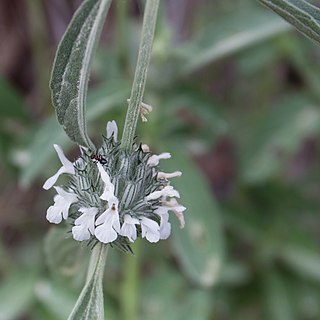
Acrotome is a genus of plants in the family Lamiaceae, first described in 1838. The genus is native to the southern part of Africa.

Platostoma is a genus of flowering plants in the mint family, Lamiaceae, first described as a genus in 1818. It is native to tropical parts of Africa, southern Asia, Papuasia, and Australia. Mesona and Acrocephalus has been known as its synonyms.
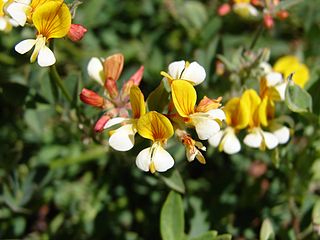
Hosackia is a genus of flowering plants in the family Fabaceae (legumes). It is native to western North America, from British Columbia in Canada to Mexico.
Nesogenes is a genus of flowering plants belonging to the family Orobanchaceae.
Dopatrium is a genus of flowering plants belonging to the family Plantaginaceae.

















